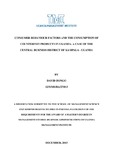| dc.contributor.author | Dongo, David | |
| dc.date.accessioned | 2019-10-22T13:08:12Z | |
| dc.date.available | 2019-10-22T13:08:12Z | |
| dc.date.issued | 2013-12 | |
| dc.identifier.citation | Dongo, David (2013) Consumer Behavior Factors and the Consumption of Counterfeit Products in Uganda: A case of the Central Business District of Kampala, Uganda | en_US |
| dc.identifier.uri | https://hdl.handle.net/20.500.12305/795 | |
| dc.description.abstract | The study set out to investigate the relationship between consumer behaviour factors and the
consumption of counterfeit products in Uganda so as to address the problem of increased
consumption of counterfeit products in Uganda. The objectives of the study were to examine
the relationship between consumer attitudes and consumption, to investigate the relationship
between social influences and consumption, to determine the relationship between perceived
behavioural control factors and consumption, and to assess the moderating effect of law
enforcement on consumer behaviour and the consumption of counterfeit products in Uganda.
The researcher mainly applied quantitative research design supplemented by qualitative
findings using a cross-sectional study approach. A sample of 372 respondents selected from
traders in the Central Business District of Kampala was used. The overall findings indicated
that consumer behaviour factors do not explain the consumption of counterfeit products in
Uganda. Correlation findings indicated social influence as a significant factor while consumer
attitudes and perceived behavioural were not significant. Other findings indicated that original
products are expensive, and yet counterfeits offer shorter usage life. The moderating effect of
law enforcement was found not significant on consumer behaviour factors and consumption of
counterfeit products. It was concluded that other factors rather than consumer behaviour factors
may be explaining the consumption of counterfeit products in Uganda. Besides, it was
recommended that social groups should be identified and sensitized to influence others against
counterfeits in communities. Government should allow tax exemptions on original products
and hike taxes on counterfeits to address the high price on originals and appropriate product
information be availed to consumers through adverts and brand outlets to facilitate shopping
decisions to combat counterfeiting in Uganda. Counterfeit products attributes, market stimuli,
corruption, legislation and the prevalence of counterfeiting in Uganda were areas
recommended for further research. | en_US |
| dc.language.iso | en | en_US |
| dc.publisher | Uganda Management Institute | en_US |
| dc.subject | Consumer Behavior Factors | en_US |
| dc.subject | Consumption | en_US |
| dc.subject | Counterfeit Products | en_US |
| dc.subject | Uganda | en_US |
| dc.title | Consumer Behavior Factors and the Consumption of Counterfeit Products in Uganda: A case of the Central Business District of Kampala, Uganda | en_US |
| dc.type | Thesis | en_US |

